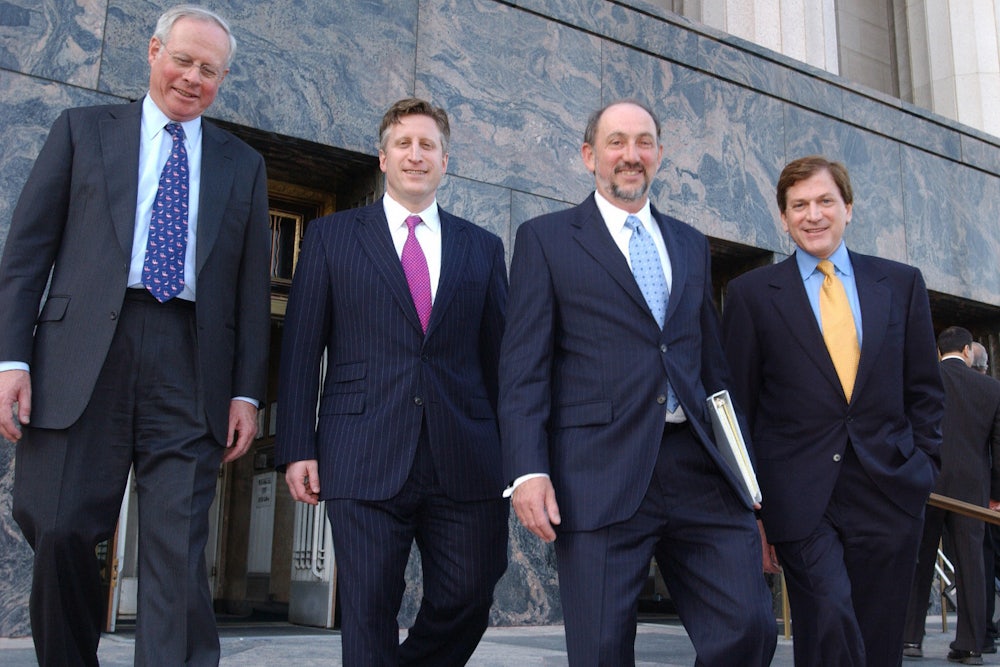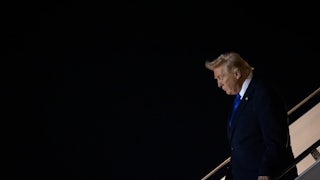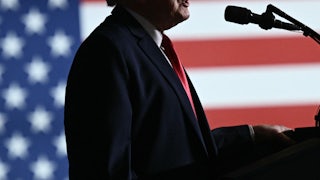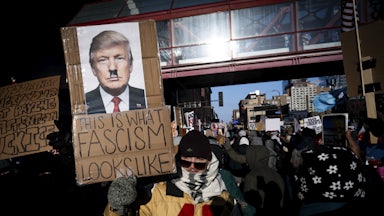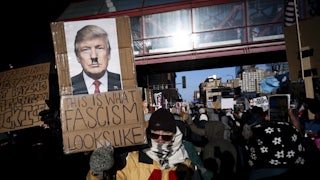When circumstances require you to make an insane argument, one rhetorical obstacle is a shortage of facts to support it. Donald Trump and his supporters address this difficulty by telling lies more bald-faced than anything we’ve seen since the red-baiting heyday of Joe McCarthy. “The election was rigged” is the new “I have here in my hand” a list of 205 Communists working in the State Department, or 57, or 81, or maybe it’s 10, and no, you can’t see it.
Respectable news outlets typically bar Big Lie arguments from appearing in their editorial pages, which is why you don’t see many letters to the editor denying the Holocaust or the moon landing. But I’m sorry to report early signs that this prohibition may be giving way to a more click-friendly standard. Thus The Wall Street Journal published a Trump letter on October 27 that spouted his usual fabrications about the 2020 election being “rigged,” followed the next day by an editorial conceding that of course Trump’s rantings were lies (the Journal used the more polite term “bananas”), but they were newsworthy lies.
The Washington Post’s media reporter, Jeremy Barr, was very censorious about this breach, citing an online guide that says letters will be “edited for clarity, fact-checked, and sometimes trimmed.” A separate Post online guide says op-eds are fact-checked, too. But an op-ed that the Post published on November 13 by George J. Terwilliger III, former deputy attorney general under President George H.W. Bush, was pretty, well, bananas.
Terwilliger is lawyer to former Trump chief of staff Mark Meadows, who refuses to cooperate with a House committee investigating a deadly insurrection that took place on January 6 with the aim of preventing Congress from counting electoral ballots in the 2020 election. Meadows claims executive privilege for urging then-President Trump (presumably) not to encourage the deadly insurrection. That was a privileged conversation! To fulfill his constitutional duties, the president needed to hear a full range of views on whether to encourage a deadly insurrection or not! That required confidentiality! Steve Bannon, who turned himself in to federal authorities on Monday while proclaiming, “We’re taking down the Biden regime,” went unmentioned in Terwilliger’s op-ed, but he, too, claims executive privilege for urging Trump (presumably) to encourage the insurrection. That was a privileged conversation too!
Terwilliger expected Biden to defend Meadows’s executive privilege claim because presidents usually do, even if they involve claims related to previous administrations. They do this to avoid establishing precedents that will make it easier for Congress or the courts to harass their own administration. But Biden took a pass, and Terwilliger pronounced himself appalled. The Biden administration, Terwilliger claimed in his Post op-ed, is “the first in history not to resist a congressional subpoena for testimony from a senior White House aide.”
Editors are trained to slow way down whenever they encounter phrases like “the first in history,” but the Post let this through. It isn’t true. Even White House chiefs of staff (past and present) have appeared before Congress with little or no fuss about executive privilege.
President Dwight D. Eisenhower’s chief of staff, Sherman Adams, whom some consider the most powerful White House chief of staff in history, testified in June 1958 before Congress about a $700 vicuña coat and other gifts he accepted from Bernard Goldfine, a textile manufacturer under investigation by the Federal Trade Commission. The scandal forced Adams’s resignation three months later. Far from resisting congressional meddling, the administration lent Adams no help at all. “Not one member of the administration helped [Adams] prepare his difficult statement,” according to columnist Drew Pearson, who’d broken the scandal story.
Four decades later, former White House chief of staff Donald Regan followed Adams’s lead and testified before Congress about the Iran-contra scandal without making any executive privilege claim. In Regan’s 1988 memoir, For the Record, he relates that when he told President Ronald Reagan he wanted to testify, Reagan, whose administration the scandal had placed in serious peril, “let out a relieved breath” and told him he was glad to hear it. Reagan had already waived executive privilege for his national security adviser, Robert McFarlane; for Secretary of Defense Caspar Weinberger; for Secretary of State George Shultz; for Attorney General (and recent counselor for the president) Ed Meese; and even for his CIA director, William Casey.
In between, H.R. Haldeman, former chief of staff to President Richard Nixon, testified before the Senate Watergate committee in August 1973. By then Nixon, who’d initially made sweeping claims of executive privilege on the part of White House aides, was so desperate to counter the devastating testimony two months earlier from former White House counsel John Dean, that he was, like Reagan, encouraging current and former aides to appear before the committee. Haldeman later served an 18-month prison sentence for, among other things, perjuring himself before the committee.
One could go on. A 2014 Congressional Research Service report contains a very long list of presidential advisers who testified before Congress while still serving in that capacity, and a much shorter list of advisers (Henry Kissinger, Karl Rove, a few others, nearly all of them Republicans) who refused, claiming executive privilege.
Do people get convicted of contempt of Congress? They do, though for the past half-century the punishment has been light. The Nixon Justice Department prosecuted G. Gordon Liddy for contempt of Congress. He got a suspended sentence in May 1974 because he was already doing 20 years for various other Watergate crimes, including contempt of court. (Liddy ended up serving four and a half years, after President Jimmy Carter commuted his sentence.) Also in 1974, the Nixon Justice Department prosecuted former Attorney General Richard Kleindienst for contempt of Congress. Kleindienst pleaded nolo contendere to contempt of Congress to avoid doing hard time for perjury. (He’d told Congress that no one from the White House told him to drop the Justice Department’s prosecution of International Telephone and Telegraph Corp. That was untrue; Nixon told him to do it.) The judge suspended Kleindienst’s 30-day prison sentence and also his $100 fine.
The last person convicted for contempt of Congress was Richard Helms, former CIA director, in 1977, for deceiving Congress about America’s role in overthrowing President Salvador Allende in Chile. Helms followed the Kleindienst playbook; he pleaded nolo contendere to contempt to avoid prosecution for perjury, got off with a suspended sentence and a $2,000 fine, and remained, until his death in 2002, a member in good standing of Georgetown’s cocktail party circuit. The Carter administration made no effort to block this prosecution on constitutional grounds.
As these examples demonstrate, it’s the rare person who gets prosecuted for contempt of Congress who didn’t also get prosecuted for more serious offenses. An exception from an earlier era would be the Hollywood Ten, whose “crime” began and ended with refusing to name names. They nonetheless were sent to prison; Dalton Trumbo served 11 months.
Rita Lavelle, who ran the Superfund environmental clean-up program during the Reagan administration, was the last person to be put on trial for contempt of Congress. She beat that rap in 1983, but the following year she was sentenced to six months in prison for lying to Congress. (She served four.) Thirty years later, in 2014, Lavelle was convicted of lying to the FBI and two counts of wire fraud and went to prison again, this time for more than two years. (I’m indebted for these details to The Washington Post’s Timothy Bella.) When Lavelle was at the Environmental Protection Agency, she worked for Anne Gorsuch Burford, mother to Supreme Court Justice Neil Gorsuch. Burford got tarred in the same Superfund scandal and was forced to resign in disgrace but not before she herself had a criminal referral made to the Reagan Justice Department for contempt of Congress. In that instance, the referral was canceled after the EPA cooperated with Congress.
Another glaring untruth in Terwilliger’s op-ed concerns the origins of executive privilege. (I’ll be brief because I don’t have all day.) Terwilliger writes: “The history of executive privilege began with President George Washington.” No, it didn’t. I’ve seen electrical appliances still in working order that are older than executive privilege. As I explained last month, the concept of a sweeping confidentiality protection mimicking lawyer-client privilege was dreamed up by Eisenhower in 1954; given a name three years later by George Cochran Doub, Eisenhower’s assistant attorney general for the civil division; and finally recognized by the Supreme Court in 1974. The specific privilege Washington claimed was a separation-of-powers assertion of the type that would later become fairly routine, buttressed by Washington’s claim that international diplomacy required some level of secrecy.
But Terwilliger’s most dangerous assertion is his lie that senior presidential advisers never testify before Congress without a fight. I’ve now described several who did so, usually in connection with more serious crimes. Yet none of these crimes is quite so disturbing as a deadly insurrection against the government, aimed at canceling a presidential election. Bannon and Trump stand accused of encouraging or even participating in that insurrection, and what Meadows saw and heard is quite obviously relevant.
If you think I’m exaggerating, you’ve forgotten. Before the rioters invaded the Capitol, President Donald Trump said to them: “We’re going to walk down to the Capitol, and we’re going to cheer on our brave senators and congressmen and women, and we’re probably not going to be cheering so much for some of them. Because you’ll never take back our country with weakness.” By “take back our country,” Trump meant “prevent the counting of electoral ballots,” something he was very publicly trying to persuade Vice President Mike Pence to do. Even the editorial page of The Wall Street Journal called it “a disgrace.”
During the impeachment trial that followed, Trump’s lawyers made much of the fact that Trump told the crowd to march “peacefully and patriotically.” But he gave the lie to that peaceful sentiment, once the violence began, by resisting pleas that he tell the rioters, whom he was watching on television, to go home. He resisted these pleas for 187 minutes. One of the pleas came from House Republican leader Kevin McCarthy. Trump replied, “Well, Kevin, I guess these people are more upset about the election than you are.” Nobody disputes this. Even McCarthy doesn’t dispute it (though he declines to talk about it).
Trump was president of the United States, and he didn’t stop a violent insurrectionary riot because he liked that it prevented from being counted electoral ballots that showed he lost the election. It happened. You didn’t imagine it. And now these people and their lawyers want to publish lies about it. The press mustn’t let them.
